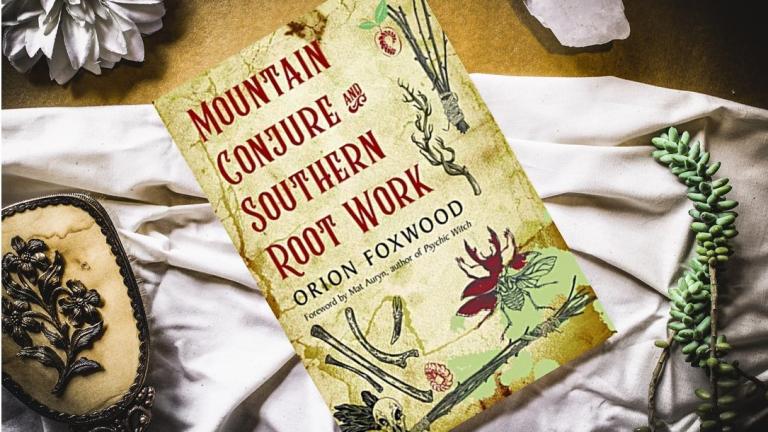Conjure might be one of my favorite subjects. It’s a fully realized American form of magic, one that follows the experience of human migration to this continent. As with that human experience, conjure varies based on where it’s learned and from whom; it is the synthesis of knowledge gleaned in other places to best apply it on this continent; it reflects the particular types of oppression that humans have inflicted upon one another in this hemisphere, being a tool used most often by the oppressed; it’s also packed with ways to live in relationship with spirits in this land, which speaks to my animist heart. I have read, reread, and embraced the teachings of Mountain Conjure and Southern Root Work. With each pass through these pages, I gain deeper insights into these practices, and also into myself.
It’s clear from how this book is structured that Foxwood is a teacher before anything else. Understanding that subtle arts like conjure can never be fully conveyed through words on a page, the author nevertheless seeks to root the reader in the history and theology that underpin this particular style of conjure. If you are the sort who is tempted to skip to the spells, this may not be the best choice for your reading pleasure. To be clear, there are lots of very specific practices laid out in minute detail, but if you flip past the first hundred or more pages to get to instructions on uncrossing, for example, you’ve missed out on the inner work of doctoring your own root that is essential to get anything out of what comes next. Give yourself the gift of patience, and take the work of those early chapters seriously if you want to embrace this discipline.
Foxwood also tackles the history and cultural context of conjure in an unapologetic way. While all forms of conjure have roots that can be traced back to a variety of peoples, including the first ones to come to the Americas some 12,000 years ago as well as the poor folk scratching out a subsistence life in the Scottish highlands, a big part of any conjure tradition is owed to the Africans who were shackled, shipped, and treated as property, and to their descendants who were treated in the same way for a shameful number of generations. Another layer that is an essential part of conjure is its reference to biblical verses and deities. Rather than downplaying or ignoring either of these historical pillars, and the author makes it clear that they are part and parcel of these practices and must be embraced to use them authentically.

It’s when Foxwood writes about growing one’s spirit that the casual reader is separated from the serious worker. “The most important spirit those who seek to be spirit workers can ever conjure to this world is their own,” the author writes. Regardless of one’s cultural, geographic, and genetic background, heeding the lessons of this chapter will lead to profound change. One could do worse than to just reread this one section four or five times a year for life. Even if it doesn’t lead to developing relationships with some of the other spirits Foxwood discusses, it would not be wasted time.
There are indeed specific practices that include work with ancestors and spirits encountered in graveyards, along with those who dwell in certain plants and places. If the reader wants to add to a collection of healing or prosperity magic, this book has that and more—but again, don’t expect much of it to work for someone who hasn’t doctored one’s own root first. There is information aplenty here, but those without wisdom may find it out of reach. Fortunately the path to that sort of wisdom is laid out, too. In many ways, reading this feels more like being with a teacher than it does leafing through a reference work. The best way to learn anything esoteric uses a combination of both, but this is a pretty decent choice for someone who hasn’t found a teacher quite yet.
Quirks: this book has a lovely “hold my beer” passage in the form of “a recipe for attracting prosperous spirits.” These are passages that cause the reader to wonder if the exercise exists only on paper, or if anyone has tried it in the real world. When I see one, it makes me want to give it a try. This particular recipe involved some very specific ingredients, including a fist-sized lodestone and some other items that I did not have lying about my home. I carefully gathered all the necessary items over a period of weeks, and then I completed the steps as instructed. As it happens, I purchased the original version of this book—published with a different name—circa 2013, which means that I’m in a position to report that after feeding these spirits for a number of years, the prosperity of my family continues to grow. It took until sometime in 2014 before I was ready to begin this particular work, but seven years is enough time for me to pronounce this recipe as one that can be completed successfully.

Quibbles: Foxwood is unapologetic about the fact that conjure is a tradition that is heavily influenced by Christianity, and I appreciate that openness. Abrahamic religions represented a relatively well-documented bridge to the past, and are the only lens through which we can glimpse some folk traditions. What I wish had been addressed differently is the thread of monotheism that runs through the book without examination. Foxwood’s understanding of the universe is that no matter how many gods one believes exists, everything can be traced back to a single source which in some traditions is named with the common noun “god.” The language used suggests that this, at least, is something on which we can all agree, but in fact it is not something about which everyone can agree. I fully support the right of someone to believe that whoever they worship is an emanation of some singular source, in part because I once worshiped a god who told me that very thing and even turned into Herne to drive home the point. However, the gods I worship now are in no way part of some other deity, and have made that abundantly clear to me. The author could have framed the idea as being part of particular traditions rather than suggesting it’s a universal understanding. I found it distracting, because by exposing this blind spot Foxwood reminded me that I have some of my own that I’ve yet to discover.
Fortunately, the vast majority of people who read a book like this will find that quibble is beneath their notice. The reason to raise it is to show that this is the biggest problem I have with a largely outstanding book.
Title: Mountain Conjure and Southern Root Work
Author: Orion Foxwood
Publisher: Red Wheel/Weiser
ISBN: 978-1-57863-736-2


















